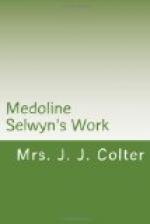“If we believe all the nonsense those chaps who are continually meddling with nature’s secrets tell us, we should sit with shut lips and folded hands lest we would destroy the equilibrium of the universe, or our own destiny. There is any quantity of bosh let loose on poor, long-suffering humanity, and labeled Science.”
“That comes with bad grace from an embryo scholar. If I were you I would throw education ‘to the dogs’ and take things on trust like Thomas, or the Mill Road people,” I said, jestingly.
“I want to know for myself; and so not get cheated by every crank who airs his theories.”
“But, Hubert, to come back to the original dispute, if the atmosphere does not hold our every foolish or necessary word, they are permanently recorded in another place by a pen that never writes falsely, or misses a single sentence. How many pages have you got written there, I wonder, that if it were possible you would gladly obliterate with your heart’s blood one day.”
“Mother, you are worse than the scientists; at least more terrifying. Do you know, Miss Selwyn, when I was a little chap she had me persuaded to be a missionary to Greenland, or the South Pole. I had made up my mind to choose the very worst possible place, so as to have all the greater reward.”
“What has changed your mind?”
“Natural development, I expect. Mother is a very sweet and gentle woman, but I am sorry to say she is a crank, if there was ever one.”
“Why, Hubert, you amaze me,” I said, smiling. “I thought she was as near perfection as any one I ever knew. Excuse me expressing myself so openly,” I said, bowing to Mrs. Flaxman; “but won’t you tell me what her tendency to insanity is; for I believe cranks are a species of madmen, if I rightly understand what the word implies.”
“Over religiosity. Why, really, she used to make me long for martyrdom when I was a child.”
“I did not think a person could so soon outgrow early piety,” I said, dryly.
Hubert colored and said very little more about his mother’s early lessons after that to me; but I could see that his strange indifference respecting those subjects she held as most important of anything within reach of humanity pained her deeply.
CHAPTER VII.
Examination.
Directly Mr. Winthrop had attended to matters at once claiming his attention on his return, he began to investigate my daily avocations. I showed him the work already accomplished, so far as it could be seen—the knitting certainly excepted. My sketches in water colors and oils I brought out rather timidly for his inspection. Mrs. Flaxman had told me how severe he was in his criticisms on careless work, and possibly all through my painting the thought what he might say of what I was doing had a strong influence on the quality of my work. In some respects, no doubt, it helped me to paint




